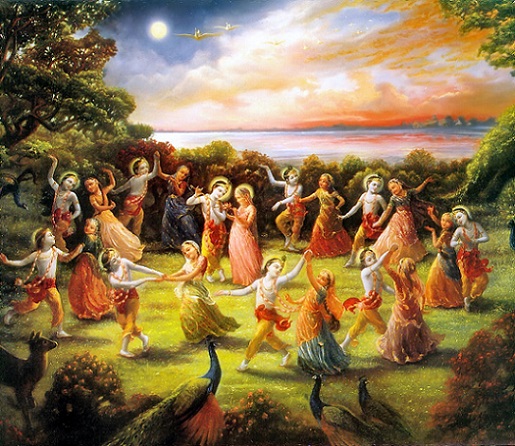(Krishna's rasa-lila—click to enlarge)
Devotee: Prabhupāda, could you tell us something about Kṛṣṇa's rasa-līlā?
Prabhupāda: Kṛṣṇa's rasa-līlā should not be discussed in public meeting. It is most confidential. Lord Caitanya Mahāprabhu never discussed. He discussed Kṛṣṇa's pastimes, līlā with gopīs, with His confidential, very confidential circle. Or those who are... Lord Caitanya had many thousands of followers, and... He was not discussing even within these five persons, śrī-kṛṣṇa-caitanya prabhu-nityānanda śrī-advaita gadādhara śrīvāsādi, Nityānanda, Advaita, Gadādhara, Śrīvāsa, and Himself, these five persons. So when He was at Navadvīpa, He was not discussing even with them, what to speak of others. He set up this example so that in future people may be very cautious. Because unless one understands what is Kṛṣṇa, how he can understand Kṛṣṇa's pastime? So this discussion of rasa-līlā is the summit of Kṛṣṇa consciousness. It is not ordinary thing. They're purely spiritual. There is nothing material. But because we are not completely free from material concept of life, we may think that Kṛṣṇa's līlā is something like this material. So that is offense. But that is the ultimate goal, to understand Kṛṣṇa's rasa-līlā. But you have to wait for relishing that Kṛṣṇa's rasa-līlā, to become more perfect in Kṛṣṇa consciousness. Anarthāpagamam. Anartha means when one is freed from all anarthas. But it is so nice, even those who are with anartha, misgivings, if they are devotee, if they have got full surrender unto Kṛṣṇa, so they also will derive benefit.
Kṛṣṇa's rasa-līlā means that Kṛṣṇa was adopted or foster child. Is that foster child? Yes. So, of Nanda Mahārāja. His father exchanged. His father Vasudeva wanted to save Kṛṣṇa, and he brought from Mathurā to Vṛndāvana, Gokula. And Nanda Mahārāja had a daughter. So he placed Kṛṣṇa on the lap of Yaśodā and took away the daughter, and this daughter was given to Kaṁsa for killing. Just see, there is selfishness. He wanted to save his own son and wanted to kill Yaśodā's daughter. You see? So this is not selfishness; therefore we shall misunderstand. That daughter was not ordinary child, she was the material energy herself, Durgā. So when Kaṁsa took that child by the leg and wanted to, what is called? Slash? Smash, yes. Smash on the stone, the daughter slipped from his hand and appeared as Durgā, that "You fool, you want to kill me. The boy, the child who will kill you, is already born. Don't try for killing me. He's already born." So Kṛṣṇa, up to sixteen years, He was in Vṛndāvana. Naturally, there were many children, boys and girls. They played together. So they were very... Kṛṣṇa, everyone loved. Vṛndāvana means simply center figure is Kṛṣṇa, and everyone loves.
So some of the girls, they loved Kṛṣṇa, and a girl's loving means she wants Kṛṣṇa as husband. But according to Vedic concept, the girls are married at the age of twelve to sixteen years, and boys are married from twenty to twenty-five years. So all the girls were married mostly, but Kṛṣṇa was not married. And some of the girls were not married, but all the girls, they were very fond of Kṛṣṇa. So from the childhood they were friends. So Kṛṣṇa used to play His flute, and all the girls would come. So this rasa-līlā was performed on this day, the Kṛṣṇa, in the full moon night, He played the flute, and the girls assembled and there was dance. There is similar dance, just like ball dance in your country. But the specific significance of this dance was that Kṛṣṇa bifurcated Himself in so many boys as many girls there were, and they began to dance in pair. That is sum and substance of rasa-līlā. So if you go to Vṛndāvana and if you like to dance with Kṛṣṇa, the facility is for you. That is the ultimate goal of our life. If you want to love Kṛṣṇa similarly as the gopīs loved, you can have the chance. Or if you want to love Kṛṣṇa as His cowherds boyfriend, that chance is also there. If you want to love Kṛṣṇa as child, that chance is also there. Any capacity you try to love Kṛṣṇa... Kṛṣṇa is ye yathā māṁ prapadyante (BG 4.11). "Anyone who worships Me or loves Me in any way, I am prepared to answer." He can answer...
Just like Nṛsiṁhadeva. Because Hiraṇyakaśipu wanted to love Kṛṣṇa by becoming enemy, so He also answered as enemy. So there are twelve kinds of reciprocal exchange—seven secondary and five primary. So all these rasas... Rasa means rasa. Rasa means humor. All these humors are present even in this material world in different way, as perverted reflection of the spiritual rasa. Nothing can be new here, but here it is a reflection only. Reality is there. So the five primary principles of loving affairs is there in the Vaikuṇṭha world. And Kṛṣṇa consciousness means to practice Kṛṣṇa consciousness while we are in this material body, and after giving up this body, we enter into the spiritual realm for factually participating with Kṛṣṇa. That is Kṛṣṇa consciousness movement. So if you want to enter into the rasa-līlā, if you desire like that, so you love Kṛṣṇa in that way, as the gopīs. Then you'll have the same perfection. There is no difficulty. It is not at all difficult. Simply you practice. But you have to forget the rasa-līlā of this material world. Otherwise there world then you play havoc. That risk is there. Yes. "Kṛṣṇa enjoyed with so many girls, so let me also become Kṛṣṇa and enjoy." That is finished everything. (laughter)
(baby laughs) Oh, she is appreciating. Yes. Thank you.
(Srila Prabhupada Lecture, Los Angeles, November 15, 1968)
.
.
